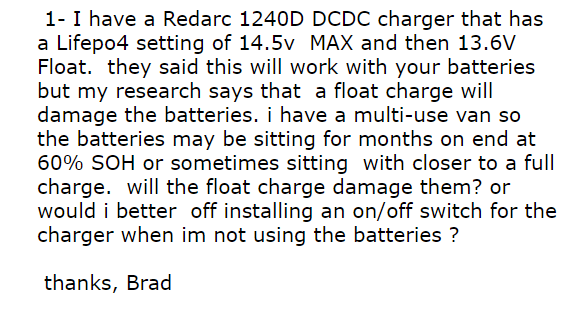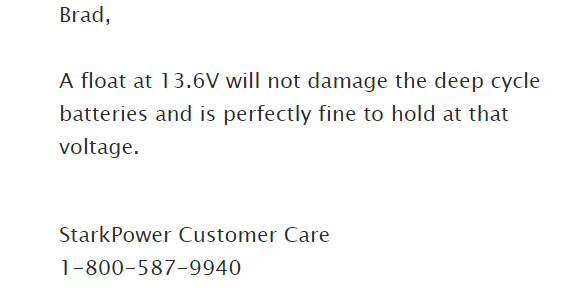You are using an out of date browser. It may not display this or other websites correctly.
You should upgrade or use an alternative browser.
You should upgrade or use an alternative browser.
Redarc1240D vs Lifepo4 ?
- Thread starter Bravo30
- Start date
like any commercially sold product, will it work? YES. will it work for everybody? NO. that's how i look at this situation. i will be adding an off/off switch anyway. its simple enough and will put my mind at ease. I have a Victron battery monitor and color control panel so ill be able to see whats going on and make adjustments from there if need be.
DiploStrat
Expedition Leader
[QUOTE="CoyoteThistle, post: 2484152, member: 29919"...
Feeling like we're well in to hijack territory here Bravo , but this is a good reminder that there isn't a one-size-fits-all approach to good battery management for Li house batteries across different vehicles. I think spreading a wider understanding of the basic parameters needed for proper LiFePO4 charging would be of benefit to the larger community. Then, people could figure out what their vehicle is doing and design a cost effective system that achieves proper charging.[/QUOTE]
, but this is a good reminder that there isn't a one-size-fits-all approach to good battery management for Li house batteries across different vehicles. I think spreading a wider understanding of the basic parameters needed for proper LiFePO4 charging would be of benefit to the larger community. Then, people could figure out what their vehicle is doing and design a cost effective system that achieves proper charging.[/QUOTE]
Sometimes some thread piracy is a useful thing.
Once upon a time, there was this thread: https://www.expeditionportal.com/fo...with-lithium-a-cryptozoological-study.165573/
Repeating the caveat that I do not have LiFePO4 batteries in my truck and that my only real experience was an afternoon playing with Starkpower batteries connected to my Chevrolet based Tiger, I have worried about the following:
-- We started with a 100Ah Starkpower battery that had been run down to the point that the internal BMS shut it down. When connected by jumpers to the Tiger (2x125A alternators) with the engine running the charge rate immediately jumped to 160A. We did not do a good job of recording the data, but they looked like this:
LiFePo 10v 160A
LiFePo 13.3A 120A
LiFePo 13.8v 106A lead 14.3V
LiFePo 13.9V 96A lead 14.4v
LiFePo 14.0v 83A lead 14.48v
LiFePo 14.1v 65A lead 14.48v
LiFePo 14.3v 46A lead 14.7v
LiFePo 14.5v 31A lead 14.7v
LiFePo 14.6v 20A lead 14.8v
LiFePo 14.7v 11.6A lead 14.8v
LiFePo 14.9v 0A lead 14.8v
Took about one hour to recover 100Ah. We did have to keep disconnecting the jumper cables to let them cool as the insulation was melting.
I normally have to recover between 75Ah and 125Ah overnight. That is, cooking two meals, espresso, furnace, refrigerator, etc. I worried that after say, three days of use at say, 100Ah per day, an LiFePO4 bank might overheat even a large production alternator.
-- My other viewing-with-alarm is that the resting voltage of LiFePO4 is typically well above 13v and that is above the "join" voltage of most VSR (e.g. Blue Sea). Might that not lead to a lead acid starter battery at say, 12.8v, discharging the LiFePO4 bank because the VSR read the 13.x volts as being evidence of a positive charge?
Rando's experience indicates that this may not be an issue, at least not with a smaller battery bank and the lower voltages of his vehicle. To the question of the Nissan, might the Nissan have a new Euro style/regen alternator?
Conventional wisdom is that whenever an alternator/voltage regulator sees a voltage below its target, it will start to produce amps. This being the reason that some B2B, specifically the older Sterlings, drew down the voltage of the starter battery to 13v, so that the alternator would respond. Also the reason that large cables are required with a good VSR setup, if the alternator can't "see" the camper battery, it won't respond.
Comments. observations, and corrections welcomed as I am trying to spend other people's money before I start investing in lithium!
Feeling like we're well in to hijack territory here Bravo
Sometimes some thread piracy is a useful thing.
Once upon a time, there was this thread: https://www.expeditionportal.com/fo...with-lithium-a-cryptozoological-study.165573/
Repeating the caveat that I do not have LiFePO4 batteries in my truck and that my only real experience was an afternoon playing with Starkpower batteries connected to my Chevrolet based Tiger, I have worried about the following:
-- We started with a 100Ah Starkpower battery that had been run down to the point that the internal BMS shut it down. When connected by jumpers to the Tiger (2x125A alternators) with the engine running the charge rate immediately jumped to 160A. We did not do a good job of recording the data, but they looked like this:
LiFePo 10v 160A
LiFePo 13.3A 120A
LiFePo 13.8v 106A lead 14.3V
LiFePo 13.9V 96A lead 14.4v
LiFePo 14.0v 83A lead 14.48v
LiFePo 14.1v 65A lead 14.48v
LiFePo 14.3v 46A lead 14.7v
LiFePo 14.5v 31A lead 14.7v
LiFePo 14.6v 20A lead 14.8v
LiFePo 14.7v 11.6A lead 14.8v
LiFePo 14.9v 0A lead 14.8v
Took about one hour to recover 100Ah. We did have to keep disconnecting the jumper cables to let them cool as the insulation was melting.
I normally have to recover between 75Ah and 125Ah overnight. That is, cooking two meals, espresso, furnace, refrigerator, etc. I worried that after say, three days of use at say, 100Ah per day, an LiFePO4 bank might overheat even a large production alternator.
-- My other viewing-with-alarm is that the resting voltage of LiFePO4 is typically well above 13v and that is above the "join" voltage of most VSR (e.g. Blue Sea). Might that not lead to a lead acid starter battery at say, 12.8v, discharging the LiFePO4 bank because the VSR read the 13.x volts as being evidence of a positive charge?
Rando's experience indicates that this may not be an issue, at least not with a smaller battery bank and the lower voltages of his vehicle. To the question of the Nissan, might the Nissan have a new Euro style/regen alternator?
Conventional wisdom is that whenever an alternator/voltage regulator sees a voltage below its target, it will start to produce amps. This being the reason that some B2B, specifically the older Sterlings, drew down the voltage of the starter battery to 13v, so that the alternator would respond. Also the reason that large cables are required with a good VSR setup, if the alternator can't "see" the camper battery, it won't respond.
Comments. observations, and corrections welcomed as I am trying to spend other people's money before I start investing in lithium!
CoyoteThistle
Adventurer
like any commercially sold product, will it work? YES. will it work for everybody? NO. that's how i look at this situation. i will be adding an off/off switch anyway. its simple enough and will put my mind at ease. I have a Victron battery monitor and color control panel so ill be able to see whats going on and make adjustments from there if need be.
You've got a good plan I think. The thing to watch once you get up and running will be weather the Redarc pushes the batteries up to 14.5v every morning even though they are full (and resting at around 13.6v after sitting without load or charge overnight). Your Victron monitors will let you know if this is happening or not. If it is, best to keep your switch in the disconnect position when not camping.
I have the same questions about the typical VSR units with Lithium. Victron's line of Lithium-specific Cyrix combiners have much higher voltage triggers than the lead acid units but like you say, maybe in practice it's not an issue?-- My other viewing-with-alarm is that the resting voltage of LiFePO4 is typically well above 13v and that is above the "join" voltage of most VSR (e.g. Blue Sea). Might that not lead to a lead acid starter battery at say, 12.8v, discharging the LiFePO4 bank because the VSR read the 13.x volts as being evidence of a positive charge?
Rando's experience indicates that this may not be an issue, at least not with a smaller battery bank and the lower voltages of his vehicle. To the question of the Nissan, might the Nissan have a new Euro style/regen alternator?
Conventional wisdom is that whenever an alternator/voltage regulator sees a voltage below its target, it will start to produce amps. This being the reason that some B2B, specifically the older Sterlings, drew down the voltage of the starter battery to 13v, so that the alternator would respond. Also the reason that large cables are required with a good VSR setup, if the alternator can't "see" the camper battery, it won't respond.
Comments. observations, and corrections welcomed as I am trying to spend other people's money before I start investing in lithium!
I think the Frontier alternator is controlled by the trucks computer (fuel savings is likely the reason) but it is not a regen system. Pulling the fuse shuts down this computer control and makes it "dumb" alternator with thermal protection intact. Worked out perfectly for me actually but again, this is a vehicle-specific solution that happened to work out.
I imagine a lot of Sprinter owners will be interested in Bravo's results.


